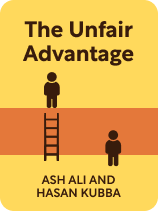

This article is an excerpt from the Shortform book guide to "The Unfair Advantage" by Ash Ali and Hasan Kubba. Shortform has the world's best summaries and analyses of books you should be reading.
Like this article? Sign up for a free trial here .
Is knowledge your secret weapon? How can you leverage your learning to strengthen your startup?
If you have considerable or specialized knowledge, you have a leg up over the competition. Knowledge is one of the unfair advantages identified in the book The Unfair Advantage by entrepreneurs Ash Ali and Hasan Kubba. The authors discuss a potential drawback of knowledge, how to know if knowledge is your unfair advantage in particular, and how to improve and make the most of your knowledge.
Continue reading to learn about the importance of knowledge in entrepreneurship.
Unfair Advantage #2: Knowledge
Knowledge includes formal or informal learning as well as insights you gain from life experiences. As Ali and Kubba explain, if you have a solid foundation of knowledge, you’re more likely to be aware of complex variables that can impact your startup’s growth. This allows you to make better decisions to increase your chances of success. This highlights the importance of knowledge in entrepreneurship.
(Shortform note: Research reinforces the link Ali and Kubba make between education and entrepreneurship. In one survey of startup founders, 95% had a bachelor’s degree or higher, and 47% had more advanced degrees. Also, the vast majority of wealthy individuals hold at least a bachelor’s degree. However, more education isn’t always beneficial. Formal education can be expensive, requiring you to incur debt that can hamper your startup dreams. And not all education is relevant for entrepreneurship. For example, a philosophy degree may not be as helpful as a business degree.)
A Potential Drawback of Knowledge
That said, as Ali and Kubba explain, knowledge can be a drawback. For example, if you have a huge bank of knowledge, you might become overwhelmed thinking about all the possible actions you could take and all the potential barriers that could disrupt your plans. This excessive deliberation can stymie progress.
(Shortform note: According to research, high intelligence is strongly correlated with anxiety, validating Ali and Kubba’s assertion that more knowledge may work against you. People who are more knowledgeable detect more threats in any given situation and tend to continuously scan for new information, which contributes to anxiety. Also, smart people are more prone to overthinking, which can stall forward momentum in your startup when you need it most. To avoid “analysis by paralysis,” experts recommend breaking through anxiety by getting into action. Create a simple plan and identify little steps you can take to work toward the results you want.)
How to Know If Knowledge Is Your Unfair Advantage
To determine if knowledge and education are an unfair advantage for you, the authors recommend that you consider what formal training you’ve had, how adept you are at understanding difficult concepts, and whether it’s easy for you to identify unmet needs in the market. Also, consider if you’re generally good at coming up with creative solutions to problems.
(Shortform note: A professional self-assessment, such as Gallup’s online CliftonStrengths test, can help you determine how strong your knowledge and education are. In StrengthsFinder 2.0, a companion book to the online test, Tom Rath says that if you score high on critical thinking and problem solving—indicating that you have knowledge and education as an unfair advantage—you can make the most of these skills by discussing your ideas with others. Feedback will help you further increase your effectiveness.)
How to Improve Your Knowledge
If you’re weak in this area, here are some steps you can take to improve:
- Read more and seek to increase your understanding of diverse topics and industries.
- Take courses to expand your skill set.
- Talk to people with expertise in your areas of interest.
(Shortform note: The steps Ali and Kubba suggest to expand your knowledge—seeking insights through reading, courses, and professional contacts—coincide with the habits of successful entrepreneurs. According to research, successful entrepreneurs prioritize learning. The more successful they are, the more time they devote to reading. They also focus on building powerful networks they can tap into for support or resources. To start developing in this area, aim to read at least 30 minutes a day, either first thing in the morning or before you go to bed. Meanwhile, to expand your network, start making connections online, where you can connect with people from all over the world through email, instant messaging, or video chat.)

———End of Preview———
Like what you just read? Read the rest of the world's best book summary and analysis of Ash Ali and Hasan Kubba's "The Unfair Advantage" at Shortform .
Here's what you'll find in our full The Unfair Advantage summary :
- The guidebook you need if you're planning to start a business
- How to find and use your unfair advantages (everybody has some)
- The steps you must take to achieve startup success






